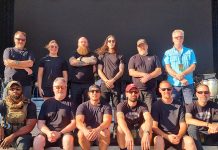When lighting designer Rodger Pugh, his co-designer Craig Richter,and production manager Joey Dileo began working on the lighting for Halestorm’s current tour, they collectively developed a clear vision for the show’s final design.
Through this collaboration, they created a concept somewhere between an “80s rock show and a ‘90s high school prom. “For a rock show, you naturally want those big, punchy, high-energy moments, but we also wanted to give the audience room to breathe during the softer, more introspective parts,” said Pugh. “For the high-energy, punchy parts, we leaned into bold, saturated colours—like deep reds, electric blues, and intense purples—to give the space a sense of urgency and power. At other points, we went with more subtle tones. With this tour, we tried to balance the two elements.”
Working with Dileo production design, Pugh and Richter achieved this equilibrium with help from 48 CHAUVET Professional fixtures supplied by Bandit Lites.
“We used eight Nexus panels beneath the drummer, which gave us a powerful, rich saturation of light,” said Pugh. “The drummer is a central part of the performance, so it was crucial that this area remain a focal point. These panels really made that possible allowing us to highlight the drummer in a bold, visually striking way.”
Pugh, Richter and the production team (Sam Morgan and Van Boer) also called upon 40 COLORdash Accent 3 LED washes.
“This setup under the risers creates a dynamic pixel grid that adds a ton of depth to the stage visuals,” said Pugh. “We are using them to play with a wide range of effects, from subtle shifts to more intricate patterns, giving us the flexibility to create visuals that complement the music in creative and unexpected ways. The combination of these fixtures gave us a layered, immersive design that enhanced the entire visual experience of the show.”
Also adding depth to the show, were the design’s light angles and the resultant long shadows. “For this show, I really wanted to explore dynamic shadows and highlights, which gave the performers more texture and presence on stage,” explained Pugh. “It also helped build a sense of mystery and movement—sometimes the angles would highlight specific moments, almost like framing a scene in a movie, and other times they created more abstract visuals.”






